Papers by László Csicsmann
The Arabist: Budapest Studies in Arabic
The terminology and theory of “regional security complexes” (RSC) may be new, yet, the underlying... more The terminology and theory of “regional security complexes” (RSC) may be new, yet, the underlying factors, causes and characteristics are as old as human civilization and/or the River Nile. Out of the eleven countries the Nile is flowing through, Ethiopia and Egypt – with in-between Sudan – are “hosting” the Blue Nile, which carries about 85% of all the river’s water. With both Egypt and Ethiopia trying to cope with a rapidly growing (exploding) population of already over one hundred million each, as well as the necessity of providing food and electricity, water sharing has become an imminent task and a direct threat for both. Thus, the recent – but already decade-long – hostility between Egypt and Ethiopia over the sharing of the water of the river resulted in the emergence of a new regional security sub-complex, that of the Nile basin.

A tágabb közel-keleti térségben 2018 végén egy újabb tüntetéssorozat vette kezdetét, amelyet a mé... more A tágabb közel-keleti térségben 2018 végén egy újabb tüntetéssorozat vette kezdetét, amelyet a média előszeretettel az „arab tavasz” második hullámaként emleget. A tüntetések négy államban – Algériában, Irakban, Libanonban és Szudánban – a vezetőknek a hatalomból való elmozdításához, majd egyfajta politikai átmenethez vezettek. A tanulmány arra tesz kísérletet, hogy a komparatív politikatudomány és a nemzetközi kapcsolatok diszciplínája segítségével dekonstruálja a 2019-es közel-keleti tüntetéseket. Vajon a négy államban történt események ugyanannak a régióbeli átalakulásnak az egyik epizódjaként, vagy egy teljesen új folyamat kezdeteként értelmezhetőek? Beszélhetünk-e velük kapcsolatban rezsimváltásról, és milyen forgatókönyvei lehetnek az átmenetnek? Mennyiben érinti a régió stabilitását az új tüntetéshullám? Az „arab tavasz” 10. évfordulójához közeledve hogyan összegezhetjük a 2010/2011- et követő átalakulás mérlegét? A tanulmány azt vizsgálja, hogy a négy államban a rezsim intéz...
Вишеградская Европа. Центральноевропейский журнал, 2020
The Institute of International Studies (IIS) at Corvinus University is the first and traditionall... more The Institute of International Studies (IIS) at Corvinus University is the first and traditionally the strongest site of education and research in the field of International Relations in Hungary. It is co-host to the International Relations Doctoral School, and it was the first in Hungary to launch English-language programs in International Relations on all three levels of higher education. It has led the way in internationalisation in terms of exchanges of students and teaching staff as well.
Issues & Studies
China is geographically distant from Central European states, but cultural, economic and politica... more China is geographically distant from Central European states, but cultural, economic and political exchanges between the regions are increasing. As such, the perception of China in these societies is susceptible to frames and narratives that are either instrumentally or organically created by local political elites. This paper aims to scrutinize the narratives and frames employed in the Czech Republic, Hungary and Poland during their most recent election cycles. It identifies five basic types of frames employed in the selected countries: sovereignty, opportunity, the balance of trade, debt-traps and human rights. This paper then concludes by evaluating these thematic frames and summarizes the key similarities in public discourses concerning relations with China.

Külügyi Szemle
India újradefiniálta a hidegháború klasszikusan értelmezett el nem kötelezettségének alapelvét és... more India újradefiniálta a hidegháború klasszikusan értelmezett el nem kötelezettségének alapelvét és a többirányú kapcsolatok, az ún. multialignment irányába tett lépéseket, valamint kidolgozta a stratégiai autonómia alapelvét, s mindezzel a globális hatalmi szerepvállalás felé mozdította el a külpolitikai célokat. A 2014 óta immáron a második ciklusát töltő Narendra Modi miniszterelnök a hindu nacionalizmus retorikáján keresztül sajátos színezetet adott az indiai külpolitikának, sőt egyes elemzők a Modiérát egy új irányvonal kezdetének is tekintik. Azonban a jelen sorok szerzője amellett érvel, hogy a folytonosság fennmaradt, ám a hangsúlyok és a hangvétel megváltozott. India ugyanis mostanában élesen reagált a határ menti területek egy részére igényt formáló Kína lépéseire, ami határkonfliktusokban öltött testet (2017: Doklám; 2020: Ladakh). India a Trump-adminisztráció évei alatt jelentős mértékben elmélyítette az Amerikai Egyesült Államokhoz fűződő viszonyát, mivel Kínát lényegesen...

This paper is aimed at analysing the impact of the crisis of the liberal international order on t... more This paper is aimed at analysing the impact of the crisis of the liberal international order on the transatlantic relations. Both the EU and the US have vital interest to maintain the existing international order, however regarding certain foreign policy goals we witness an increasingly divergent approach to world politics. This is the case with the Middle East, where the EU acts as a global player based on historical ties, while the United States have recently started a gradual disengagement from the region. The so-called post-American Middle East have its own opportunities as well as challenges for the European diplomacy. This article focuses on the differences between the EU and the US foreign policy goals related to the Middle East. It primarily addresses the Iranian nuclear program and the Middle East Peace Plan recently launched by the US. The author argues despite some differences in interests, the EU and the US do not perceive the region in an entirely different way

This paper is aimed at analysing the impact of the crisis of the liberal international order on t... more This paper is aimed at analysing the impact of the crisis of the liberal international order on the transatlantic relations. Both the EU and the US have vital interest to maintain the existing international order, however regarding certain foreign policy goals we witness an increasingly divergent approach to world politics. This is the case with the Middle East, where the EU acts as a global player based on historical ties, while the United States have recently started a gradual disengagement from the region. The so-called post-American Middle East have its own opportunities as well as challenges for the European diplomacy. This article focuses on the differences between the EU and the US foreign policy goals related to the Middle East. It primarily addresses the Iranian nuclear program and the Middle East Peace Plan recently launched by the US. The author argues despite some differences in interests, the EU and the US do not perceive the region in an entirely different way

The Journal of the Middle East and Africa
This article aims to bring together the factors of resilience, regime stability, and foreign pene... more This article aims to bring together the factors of resilience, regime stability, and foreign penetration into one research project based on the example of the Hashemite Kingdom of Jordan, which marked the one-hundredth anniversary of its statehood in 2021. Even though it exists in a neighborhood that is in turmoil, the Jordanian monarchy has managed to survive all the spillover effects from such regional conflicts. This study argues that external influences have played an increasingly significant role in political developments in Jordan since the beginning of the New World Order in 1989. Scholars of international relations often argue that foreign penetration may cause state vacuums like those that have arisen in Syria, Libya, Yemen, and Iraq. Yet, this has not been the case with other states in the Middle East. One important factor behind this resilience and regime stability is related to the behavior of foreign actors. With respect to the Hashemite Kingdom, the United States has historically been the main provider of state security. Nonetheless, at the same time the European Union (EU) has adopted a pragmatic view toward Jordan and its new resilience-building approach also helps to maintain the status quo. Moreover, the regional hegemons and swing states of the Middle East and North Africa (MENA) region do not have an interest in altering the existing order save for a few radical groups. The author argues that the convergence of the national interests of the major regional stakeholders also contributes to regime stability and that outside support has increased the resilience of its political system despite the growing frustrations of many of the country’s citizens.

Following the United States' decision to withdraw from the JCPOA in May 2018, the Iran dossie... more Following the United States' decision to withdraw from the JCPOA in May 2018, the Iran dossier has come back at the forefront of contemporary world politics. New rounds of sanctions imposed on Iran are likely to have a significant impact on the political and economic sustainability of the Islamic Republic, which has recently celebrated its 40th anniversary. They will exacerbate the existing economic difficulties in the country, which may cause occasional political unrest. Indeed, sanctions are not the only hardship suffered by the Iranian economy, but serious structural and monetary problems have also emerged. However, due to the complexity of the Iranian political system, these sanctions and economic problems are not going to endanger the existence of the Islamic Republic in the short time. This publication is part of the MENARA Future Notes series which in the form of policy briefs analyse ongoing events in the SEMCs and Middle East region, emphasising the implications for the...

South African Journal of International Affairs, 2021
The emergence of armed groups in countries such as Libya presents an opportunity for these actors... more The emergence of armed groups in countries such as Libya presents an opportunity for these actors to be engaged with other political actors in the country concerned with re-building the state. This article aims to illustrate the level of potential that key armed groups have to provide stability for state-building in post-Gaddafi Libya. A typological analysis considering the variables of legitimacy, resources and support was applied to show each group’s stabilising potential. Findings showed that the groups based in Tripoli, Misrata and Zintan have a high stabilising potential relative to other groups based on these variables; therefore, it is here argued, they are more likely to contribute positively to the post-civil war normalisation process. This potential can only be realised, however, if a majority of the actors involved in Libya choose, despite current constraints, to converge their interests and establish a legitimate government recognised by all and begin the process of inclusive statebuilding.
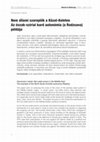
The paper is aimed at analysing the roots of the crisis of the existing state system in the Middl... more The paper is aimed at analysing the roots of the crisis of the existing state system in the Middle Eastern region. Recent years non-state actors have become new strategic players shaping the power balance on the local as well as the regional level. Non-state actors dynamically engage whether with state actors or international players. It is especially true for those weak states, which faced with the challenge of state vacuum (Iraq, Libya, Syria and Yemen). The paper focuses on the interactive engagement of the non-state actors in the Middle Eastern political orchestra. As for the non-state actors are concerned the article puts an emphasis on the Syrian Kurds as a case study in order to show how complex the situation is regarding the ongoing civil war. The Kurdish Democratic Union Party (PYD) has managed to establish a de facto autonomy in Syria mainly building on the ideology of Abdullah Ocalan in Turkey. One of the most important questions raised during any political ta...

A tanulmany celja, hogy koruljarja a tagabb Kozel-Keleten tapasztalhato modernizacios valsag hatt... more A tanulmany celja, hogy koruljarja a tagabb Kozel-Keleten tapasztalhato modernizacios valsag hatteret, lehetseges belső okait es kovetkezmenyeit. A szerző ra kivan mutatni az egyes kozel-keleti allamok modernizacios lehetősegei kozotti kulonbsegekre. Az elemzes – interdiszciplinaris megkozelitest alkalmazva – a modernizacio gazdasagi vetulete mellett a politikai es tarsadalmi kerdesekkel is foglalkozik. A tanulmany nem ter ki a kozel-keleti allamok makrogazdasagi mutatoira, hiszen erről szamos munka megjelent magyar nyelven is. / === / The goal of the paper is to analyze the background, potential causes and consequences of the modernization crisis on the boarder Middle East. The author points out the differences between the possibilities these countries have for modernization. The analyses uses an interdisciplinary approach and examines the economic, political and social aspects of modernization.

The aim of the article is to analyse the roots of the current refugee crisis in Syria. The author... more The aim of the article is to analyse the roots of the current refugee crisis in Syria. The author argues that the most effective way to solve the crisis can only be to re-establish order and stability in Syria and Iraq. However, even with the most recent international attempts to bring the different Syrian actors to engage in proximity talks, re-establishing order in Syria will not be possible in the short term for the international community. Therefore more attention is needed to address the refugee crisis in the neighbouring countries. Due to its geographical location Turkey is the most important host and transit country for Syrian and other migrants. Turkey lacks the appropriate legal system and infrastructure to handle the situation. The author argues that the international community must make a greater effort to provide the refugees with basic necessities. The EU-Turkey agreement is an important step forward, but it lacks a truly comprehensive approach to solve the crisis. Turk...

Külügyi Szemle, 2021
Az elmúlt évtizedekben a nagyhatalmak által alkalmazott szankciós rendszer jelentősen átalakult. ... more Az elmúlt évtizedekben a nagyhatalmak által alkalmazott szankciós rendszer jelentősen átalakult. A kezdetleges, általánosabb hatású intézkedéseket a célzott és az ún. okos szankciók váltották fel. A jelen tanulmány – a bevezető elméleti gondolatokat követően – a közel-keleti térség egyes országain (Líbián, Szírián, Szudánon és legfőképp az iráni esettanulmányon) keresztül vizsgálja a szankciós politika múltját és jelenét. E nyomásgyakorlás hatékonyságáról és annak méréséről a szakirodalomban hatalmas vita folyik. Az Iránt érintő szankciókat több hullámban vezették be az iráni iszlám forradalmat, illetve a 2001. szeptember 11-i terrortámadást követően. A 2015-ben aláírt nukleáris megállapodás azt az ígéretet hordozta a perzsa állam számára, hogy a főbb korlátozások betartása esetén azokat fokozatosan feloldják. 2018-ban azonban a Trump-adminisztráció egyoldalúan felrúgta a nukleáris alkut, és az ún. maximális nyomás politikájának keretében minden addiginál súlyosabb intézkedéseket ve...
Journal of Islamic Thought and Civilization, 2011
The aim of the paper is to analyse the ongoing transformation process within the Islamist movemen... more The aim of the paper is to analyse the ongoing transformation process within the Islamist movements using the example of the moderate Islamic Action Front party in Jordan. The dilemma of participation in the 2010 general elections raised tensions between the Muslim Brotherhood in Jordan and its political wing, the Islamic Action Front, and between doves and hawks of the same organizations. Internal debate on the future has started recently among different groups within the Islamist movement in Jordan.
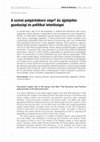
Nemzet és Biztonság, 2020
Az Aszad-rezsim által 2019 decemberében a felkelők által ellenőrzött Idlib visszafoglalására indí... more Az Aszad-rezsim által 2019 decemberében a felkelők által ellenőrzött Idlib visszafoglalására indított offenzíva a polgárháború katonai szakaszának utolsó fejezetét jelentheti. Az elkövetkező időszakban nagyobb figyelmet kap a politikai rendezés kérdése, illetve a gazdasági újjáépítés. A szíriai konfliktusban érintett szereplők közül a jelentősebb geopolitikai súllyal bíró államok (Oroszország, Irán) nem rendelkeznek kellő gazdasági erőforrással a szíriai újjáépítés kapcsán. Ezzel szemben a geopolitikailag jelenleg kevésbé meghatározó államok (Amerikai Egyesült Államok, Európai Unió és az Öböl Menti Együttműködési Tanács államai) akadályozhatják az újjáépítés folyamatát. A tanulmány célja, hogy rámutasson az elmúlt évek politikai és gazdasági folyamataira, valamint a szíriai konfliktus geopolitikai és geoökonómiai összefüggéseire. Az Aszad-rezsim az elmúlt időszakban egy olyan háborús gazdaságot hozott létre, amely politikai figurák, üzletemberek és helyi katonai milíciák szövetségér...
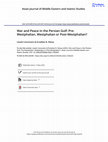
Asian Journal of Middle Eastern and Islamic Studies, 2020
The international order of territory-based sovereign nation-states (Westphalia) has been in trans... more The international order of territory-based sovereign nation-states (Westphalia) has been in transition towards a so-called 'post-Westphalian order', but pre-Westphalian structures still prevail. This has been most relevant in the Middle East and North Africa, especially in the Persian Gulf. This coincides with the increasingly delicate (im)balance of power and the changing role of the state in the Persian Gulf, expressed in such narratives as the decline of the state, the United States 'withdrawal' from the region as well as the Iranian-Saudi 'Cold War.' The paper aims at analysing war and peace in this context of the transition of the international order and the regional (im)balance of power, and highlights that war or peace in the Persian Gulf will be the outcome of the competitive multi-polarity of traditional and modern, pre-Westphalian, Westphalian and post-Westphalian actors and factors, where the modalities and methodology of all will play a role.






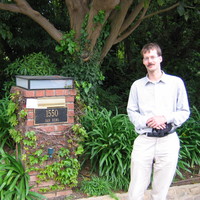
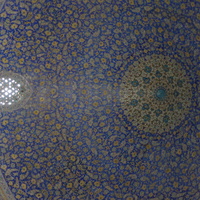


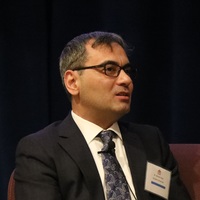
Uploads
Papers by László Csicsmann